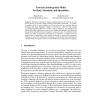Free Online Productivity Tools
i2Speak
i2Symbol
i2OCR
iTex2Img
iWeb2Print
iWeb2Shot
i2Type
iPdf2Split
iPdf2Merge
i2Bopomofo
i2Arabic
i2Style
i2Image
i2PDF
iLatex2Rtf
Sci2ools
96
Voted
BTW
2007
Springer
2007
Springer
Towards an Integrated Model for Data, Metadata, and Operations
: Information integration requires manipulating data and metadata in ways that in general go beyond a single existing transformation formalism. As a result, a complete source-to-target mapping can only be expressed by combining different techniques like query languages, wrappers, scripting, etc., which are often speci c to a single integration platform or vendor. Such a mapping is not portable across different alternative deployment scenarios, thus limiting the mapping's reusability and putting the considerable investment required to create it at risk. To avoid this vendor lock-in, we de ne an integrated representation for operations on arbitrary data and metadata that is independent of any speci c metamodel or transformation language. , we can express mappings in an abstract, vendor-neutral form, improving the interoperability of integration tools and the exibility for the deployment of mappings.
BTW 2007 | Complete Source-to-target Mapping | Single Existing Transformation | Single Integration Platform |
Related Content
| Added | 07 Jun 2010 |
| Updated | 07 Jun 2010 |
| Type | Conference |
| Year | 2007 |
| Where | BTW |
| Authors | Jürgen Göres, Stefan Dessloch |
Comments (0)

